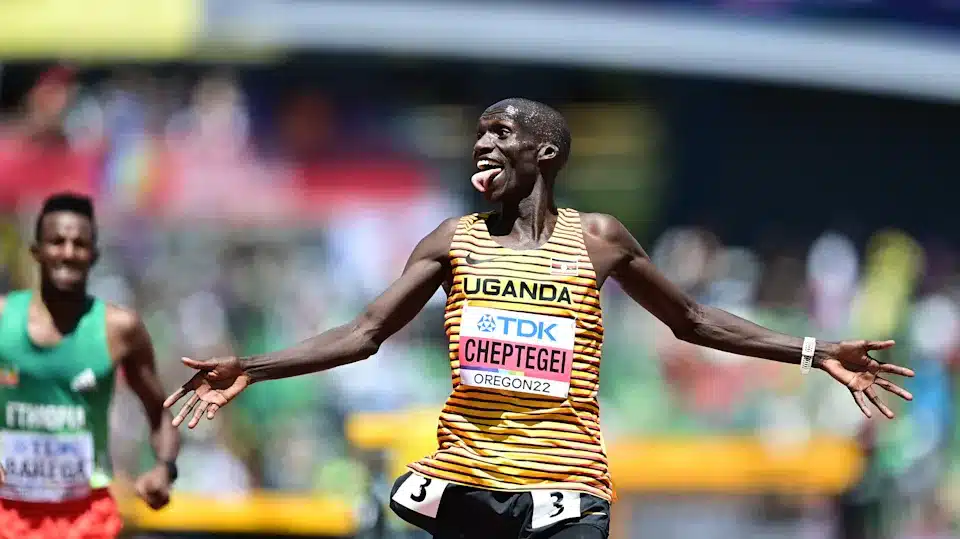The world of running is incredibly diverse, catering to a wide spectrum of individuals, each with their unique aspirations and methods.
On the one hand, you have dedicated competitive athletes who meticulously structured their training regimens to excel in their chosen events. Newcomers to the sport stand at a crossroads, excited but uncertain about their learning journey.
Often, after a while, they may get drawn to the challenge of completing a 10k, and questions about the equivalent distance in miles and the time required for such a run naturally arise.
In this comprehensive guide, you will get to know more about 10k. You will learn about how many miles a 10k, a 10k in miles, how much time it takes, what your training plan should be, and some tips to help you with the 10k run.
How Many Miles is a 10k?

10k is not just a race a milestone that embodies your dedication and progress in running. If the in 10k has puzzled you, you have nothing to worry about. 10k in miles is roughly equivalent to 6.214 miles.
While many choose to round out this figure to a more straightforward 6.2 miles, important to note that official 10k races adhere to the precise 10 kilometers, 6.214 miles. This conversion is crucial for understanding the scale of the challenge and setting realistic expectations for yourself.
Visualizing the 10k distance can be seen as more doable when broken down. Imagine running or walking on a standard 400-meter track.
To complete a 10k, you need to cover 25 total laps. If you prefer urban settings for visualization, think about city blocks. On average, a city block spans about 1/20 of a mile.
So, when navigating a 10k route within a city, you looking at tackling around 124 blocks.
How Long Does it Take to Run a 10k?

The time it takes to complete a 10k varies widely based on several factors, including your pace, age, fitness level, and more.
Whether you are an everyday runner, a beginner, or an advanced athlete, understanding the average times and responses can provide valuable insights into your performance and goals.
For the average male runner, across all age groups, the finish time for a 10k is approximately 46 minutes and 43 seconds. This equates to about 7 minutes and 43 seconds. This equates to a base of about seven minutes and 31 seconds per mile or four minutes and 40 seconds per kilometer.
On the women’s side, the average 10k finish time is around 54 minutes and 13 seconds, translating to an average space of eight minutes and 43 seconds per mile or five minutes and 25 seconds per kilometer.
For beginners, the average 10k time is about one hour, five minutes, and 30 seconds, 10:32 min/mile pace, for men. For women, 1 hour, 30 minutes,58 seconds, 11:54 min/mile pace.
On the other hand, advanced runners achieve faster times, with an average 10k finish time of 40 minutes and 54 seconds, 6:35 min/mile pace, for men, and for women, 47 minutes and 51 seconds, 7:42 min/mile.
The Fastest Runners of 10k in Miles

Ugandan runner Joshua Cheptegei holds the world record for the 10k on the track, with a remarkable time of 26 minutes and 11 seconds. This awe-inspiring record was set on October 7, 2020, in Valencia, Spain.
On the road, Kenyan runner Rhodnex Kipruto fastest 10k time stands at 26 minutes and 24 seconds, translating to an incredible pace of 4 minutes and 15 seconds per mile.
In the women category, Ethiopian Letesenbet Gidey holds the world record for 10k in miles on the track, completing it in 29 minutes and 1.03 seconds on June 8, 2021, in Hengelo, Netherlands.
For the road in miles, Ethiopian Yalemzerk Yehualaw set the women 10k world record in February 2022 in Castellón, Spain, finishing in 29 minutes and 14 seconds.
Tips to Successfully Train for Your First 10k Race

Training for miles is an exhilarating journey. Integrate the following tips into your regimen to optimize your training and stride confidently toward the finish line.
Remember, whether chasing personal records or relishing the run, each step signifies progress toward your running aspirations.
- Pace Yourself: One of the most common training pitfalls is running too fast, even for those runners adopting a more laid-back approach. However, slowing downplays a pivotal role in building your endurance.
By maintaining a manageable pace, you can extend your running sessions without needing frequent breaks. For effective stamina building, focus on the moderate-intensity aerobic exercise zone, where your heart rate should hover between 64 to 76% of your maximum heart rate, a recommendation endorsed by the CDC.
If you lack a heart rate monitor, gauge your effort level on a scale of 1 to 10, aiming for a rate of perceived exertion between 6 and 8.
- Listen to your Body: The rhythm of your guides your training. If you are experiencing lingering fatigue or soreness from prior runs, it vital to heed these signals.
Give yourself permission to incorporate cross-training activities or opt for gentle workouts. Sometimes, a rest day can work wonders in promoting recovery and preventing overexertion.
- Embrace Cross-training and Rest: To further elaborate on the previous point, running is a high-impact activity that warrants a balanced approach.
By integrating cross-training activities like cycling, swimming, or elliptical machine workouts, you can bolster your Arabic fitness while minimizing the stress on your bones, joints, muscles, and connective tissues.
This, in turn, reduces the risk of injuries that might arise from pushing your sunning limits too swiftly.
- Buddy up for Motivation: Training for miles does not have to be a solo endeavor. Enlist the support of a friend or consider joining a local running club.
The camaraderie and shared experience can up your motivation on days when enthusiasm wanes. Not only do running buddies provide encroachment, but they also transform training into a more enjoyable social activity.
- Prioritize Overall Wellness: You are not just a runner; you’re also an athlete. Alongside running, prioritize your body’s well-being. Nourish yourself with nutritious food, stay hydrated, get enough sleep, and incorporate stretching into your routine.
By treating your body as the remarkable machine it is, you will be setting the stage for peak performance and efficient recovery.
The Best 10k in Miles Training Plans

Choosing a training plan that is perfect for your needs is very important. Doesn’t matter if you have only two weeks, a moderately accommodating four weeks, or a good eight weeks at your disposal; the following comprehensive guide will help you ensure you uncover the ideal regimen for your running journey.
1. 2-Week 10k Training Plan

If you are new to running, this timeframe allows you to cultivate an efficient and economical running form.
For experienced runners, these two weeks are a chance to fine-tune facing strategies and acquaint themselves with running at a 10k pace. This space sets a strong foundation for the journey, emphasizing familiarity with 10k pacing and race-specific demand.
The following guide will offer a structured training schedule consisting of speed runs, fartlek training, and easy running, ensuring you are well-prepared to excel on race day.
Weeks | Monday | Tuesday | Wednesday | Thursday | Friday | Saturday | Sunday |
1 | Rest | 2 miles warm-up, then 5-6 x 3 mins with 2-min recoveries, then 2 miles cool-down | Rest | Rest or 40-45 min fartlek with a variety of paces and duration | Rest | 2 miles easy pace, then wither 2 miles fast or 6 x 400m with 90-sec recoveries, then 2 miles easy pace | 70-75 mins easy pace |
2 | Rest | 2 miles warm-up, then 5-6 x 2 mins with 90-sec recoveries, then 2 miles cool-down | Rest | 2 miles at an easy pace, then 1 mile at a faster pace | Rest | Rest or 4 miles easy pace with a few strides | RACE |
2. 4-Week 10k Training Plan

Within four weeks, you can witness substantial fitness gains and a gradual boost in speed. If your weekly routine already encompasses a minimum of three runs and covers 16 to 20 miles, these plans seamlessly integrate.
However, for newcomers to running, it’s advisable to focus on gradually increasing run durations before jumping into the more speed-focused structure of these schedules.
This period is ideal for working on facing strategies, interval training, and building stamina required for 10k in miles.
Weeks | Monday | Tuesday | Wednesday | Thursday | Friday | Saturday | Sunday |
1 | Rest | 3 miles at an easy pace | Rest | 2 miles at an easy pace, then 4 x 60 seconds fast, with 2 mins between reps, then 2 miles at an easy pace | Rest | 5 miles easy pace, walk some sections if you like | Rest |
2 | Rest | 3 miles at an easy pace | Rest | 2 miles easy pace, then 4 x 90 seconds fast, with 2 mins between reps, then 2 miles easy pace | Rest | 5 miles easy pace, walk some sections if you like | Rest |
3 | Rest | 4 miles easy pace | Rest | 2 miles easy pace, then 4 x 2 mins fast, with 2 mins between reps, then 2 miles easy pace | Rest | 7 miles easy, walk some sections if you like | Rest |
4 | Rest | 3 miles easy pace | Rest | 2 miles easy, then 4 x 90 secs fast, then two mins between reps, then 2 miles easy | Rest | Rest | RACE |
3. 8-Week 10k Training Plan

With an eight-week timeframe, you can witness remarkable growth in your 10k fitness. Flexibility is crucial here, especially considering a longer built-up period.
If the 10k is your central goal for the season, a 2 to 4-month preparatory period is recommended. This involves establishing a steady mileage pace, ranging from 20-25 weekly miles for thrice-a-week runners, 35-40 miles for five-days-a-week runners, and 45-50 miles for those training 6 to 7 times a week.
While incorporating slight pace variations during the build-up weeks can maintain engagement, intensive speed work is best reserved for the final eight-week focus.
Weeks | Monday | Tuesday | Wednesday | Thursday | Friday | Saturday | Sunday |
1 | Rest | 2 miles easy pace, then 4 x 400 meters, with 400 meters or 3-min jog recovered, then 2 miles easy pace | Rest | Rest | Rest | 2-2.5 miles easy pace, 2 miles faster, jog to finish | 2-3 miles easy pace |
2 | Rest | 2 miles easy pace, then 4 x 600 meters or 2 mins, with 400 meters or 3 mins jog recoveries, then 2 miles easy pace | Rest | Rest | Rest | 15 minutes easy pace, 15 minutes fast but controlled, jog to finish | 3-4 miles easy pace |
3 | Rest | 2-2.5 miles easy pace, then 4 x 800 meters or 3 mins, with 400 meters or 3-4 mins og recoveries, then 2 miles easy | Rest | Rest | Rest | 30-40 mins relaxed | 4-6 miles easy pace |
4 | Rest | 2 miles easy pace, then 8 x 400 meters or 70-80 secs, with 400 meters or 3 mins recoveries, then 2 miles easy pace | Rest | Rest | Rest | 5 miles, first half at 70%, second at 85% | 5-7 miles easy pace |
5 | Rest | 2 miles easy pace, then 8 x 500 meters or 90-100 secs, with 400 meters or 3 mins recoveries, then 2 miles easy | Rest | Rest | Rest | 35-45 mins fartlek with varied efforts and recoveries | 6-7 miles easy pace |
6 | Rest | 2-2.5 miles easy, then 5 x 800 meters or 3 mins, with 400 meters or 3 mins recoveries, then 2-2.5 miles easy pace | Rest | Rest | Rest | 7-7.5 miles gradual acceleration in 2.5 segments, i.e., 70%-80%-90% | 7-8 miles easy pace |
7 | Rest | 2-3 miles easy pace, then 10 x 400 meters or 70-80 secs, then 400 meters or 2-3 mins jog recoveries, then 2-3 miles easy pace | Rest | Rest | Rest | Warm up, then 4 x 1 mile or 5.5-6 mins, with 3-4 mins recoveries, cool down | 7-9 miles easy pace |
8 | Rest | 2-3 miles easy pace, then 5-6 x 500 meters or 90-100 secs, with 400 meters or 2-3 mins jog recoveries, then 2-3 miles easy pace | Rest | 4-5 miles easy pace | Rest | Rest | RACE |
Takeaway
This comprehensive guide has equipped you with the knowledge of what 10k in miles is, tips for completing a 10k, and structured plans to guide your training, whether you are a novice runner seeking to complete your first 10k or an experienced athlete aiming to improve your performance.
Each training plan outlined here accommodates your availability, fitness, and goals.
From the gentle two-week introduction to the empowered eight-week plan, each plan prepares you for a 10k run. Expert tips encompass crucial strategies, including privatizing recovery, fuelling properly, diversifying workouts, and celebrating milestones.
As you cross the 10k finish line, savor the accomplishment. Celebrate this achievement, but recognize this is just one chapter in your running story.




